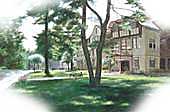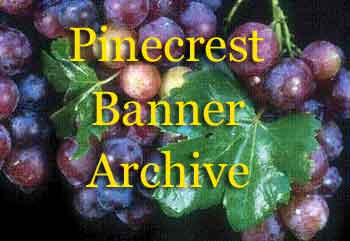Spring
1994
Selection and Responsibility
Wade E Taylor
There are two doctrinal positions concerning our justification.
The first, Calvinistic. The second, Wesleyan.
The Calvinistic view concerning justification places its
emphasis on the sovereign selection of God. From this perspective,
the Lord chooses whom He will, apart from any seeming faith
or qualification. An example of this is the selection of Jacob,
or of the Apostle Paul.
"Jacob have I loved, but Esau have I hated" Rom
9:13.
"And he said, Who art You, Lord? And the Lord said,
I am Jesus whom you are persecuting. It is hard for
you to kick against the goads" Acts 9:5 NKJ.
The Wesleyan view places its emphasis on the responsibility
of the individual in seeking God; on personal obedience, being
faithful, and on maintaining a standard of holiness. It stresses
the importance of fellowship with the Lord and on the process
of spiritual growth. An example of this is found in Prov 8:17,
21.
"I love them that love me; and those that seek me
early shall find me ... That I may cause those
that love me to inherit substance; and I will
fill their treasures."
There is truth in both views. Each can be considered to be
a different side of one coin. Each has a part in the outworking
of our redemption. To be a balanced Christian, we should understand
and relate to both in our spiritual growth and development.
These two views, sovereign selection and human responsibility,
can be seen as working together in harmony in the anointing
of David to be King over Israel. Samuel had been told to go
to the house of Jesse to anoint one of his eight sons to become
the King.
First, Eliab, a tall handsome man who was outwardly perfect
in every way came before Samuel, who said,
"Surely, the Lord's anointed is before Him."
But the Lord said unto Samuel, look not on his
countenance, or on the height of his stature;
because I have refused him: for the Lord seeth
not as man seeth; for man looketh on the
outward appearance, but the Lord looketh on the
heart" I Sam 16:6 7.
One by one the brothers came, and in turn each was rejected
by the Lord. Then David was called, approved by the Lord,
and anointed by Samuel.
"And he sent, and brought him in. Now he was ruddy,
and withal of a beautiful countenance, and goodly
to look to. And the Lord said, Arise, anoint him:
for this is he" I Sam 16:12.
David was sovereignly chosen by the Lord. But in Psalms 78:70
72, a picture is given as to why David had attracted the attention
and favor of the Lord.
"He chose David also His servant, and took him from
the sheepfolds: from following the ewes great with
young He brought him to feed Jacob His people, and
Israel His inheritance. So he fed them according
to the integrity of his heart; and guided them by
the skillfulness of his hands."
David had qualified himself through his life experience,
totally unseen by man but noticed and valued by the Lord.
In the Calvinistic view, God "elected" to reject
the first seven brothers and choose David.
In the Wesleyan view, the seven were rejected because there
were flaws in their makeup, and David was chosen due to the
integrity of his heart and the skillfulness of his hands.
These qualities had been built into David within the sheepfolds.
He refused to leave to be present for the visit of Samuel,
because a mother sheep was about to give birth to a lamb.
This faithfulness was known to the Lord.
There has been an outworking of this principle in my life.
In 1943, while in the army, I entered a small chapel. When
I was sure that no one was there, I knelt and told the Lord
that I would enter the ministry if He would bring me through
the war alive. In the Fall of 1945, I was discharged and hardly
went to Church for the next five years.
In 1950, while attending a modernistic church service, I
wondered if there was a God. I thought, in the Old Testament,
God spoke and did specific things for His people. The New
Testament records the miracles of Jesus and the Apostles and
says Jesus will return. My next thought was, "Anyone
can say all kinds of things about the past or future, but
now there is nothing." I left church thinking, "probably
there is no God at all."
Shortly after this, something began to stir within me and
I was drawn into a Full Gospel Church where I accepted Jesus
as my Saviour and Lord. From my point of view, I wandered
into this Church, but from His view, He lead me there.
In 1956, having completely forgotten the promise
I made to the Lord while in the army, the
Lord stirred me to sell all I had and enter Bible School.
After graduation, while driving south to begin a ministry
in Philadelphia, the Lord caused me to turn around and go
North to Pinecrest, which at that time, made no sense. I obeyed,
and after arriving at Pinecrest on July 4, 1959, the Lord
spoke to me. The Bible School and the Banner are the outworking
of my obedience to the word I received.
There was nothing within me that deserved the Lord placing
this desire within me. The Lord chooses whom He will, but
we have a part in this. If we look closely, we will find there
is something within those whom the Lord has drawn to Himself
that turned His heart and attention towards them.
Our desire to know the Lord and our spiritual hunger can
be considered from these two different points of view.
From a Calvinistic perspective, we were drawn to the Lord
because He created within us a desire for Him. There was deep
within us a spiritual desire and prayer that had been placed
there by the Lord, which moved us towards Him without our
praying any words, or even understanding what was taking place.
From a Wesleyan viewpoint, we somehow became spiritually
hungry and began to seek the Lord. As we perceived His drawing
presence and responded to it in cooperation and obedience,
the Lord revealed Himself to us, causing us to love and serve
Him even more.
This can be further understood by considering the pattern
of "intervention" (Calvinistic) and "cooperation"
(Wesleyan) that took place in the life of Moses.
Moses was born at a time when Pharaoh was persecuting the
children of Israel. By his order, all the male babies were
to be slain. The parents of Moses felt there was something
special about their child. Therefore, they wove a basket and
placed him in it, among the reeds in the river. His sister,
Miriam, watched from a distance to see what would happen.
The daughter of Pharaoh discovered the basket. She arranged
for Moses to be given back to his own mother, who was paid
a wage by Pharaoh to raise the one who would deliver Israel
from Egypt. This is the sovereign wisdom of God.
As Moses grew, his mother imparted within him an awareness
of his calling. Then he was taken into the palace where He
was educated in all the wisdom and glory of Egypt. Later,
Moses, being aware of his calling, visited his brethren and
saw an Israelite being abused by an Egyptian. He slew the
Egyptian thinking his brethren would understand. They did
not, and he fled from Egypt.
He had attempted to fulfill the calling on his life in his
own strength and failed. The Lord will choose whom He will
for His purposes (Intervention that requires Cooperation),
but we have a part in this. Our part is to so please the Lord
in the outworking of our daily tasks that He will notice and
choose us (Cooperation that provokes Intervention).
After forty years had elapsed, Moses, while leading sheep
towards the mountain of God, noticed a bush that burned with
fire and was not consumed. As he turned aside and stood before
this burning bush, God spoke to Him and established his calling
as a deliverer who would lead Israel from Egypt.
"And the angel of the LORD appeared unto him
in a flame of fire out of the midst of a bush:
and he looked, and, behold, the bush burned
with fire, and the bush was not consumed.
And Moses said, I will now turn aside, and see
this great sight, why the bush is not burnt.
And when the Lord saw that he turned aside to
see, God called unto him out of the midst of
the bush, and said, Moses, Moses. And he said,
Here am I" Exodus 3:2 4.
The Lord made known to Moses His intention to deliver Israel,
and to use him to accomplish it. But something more was required
of Moses.
"Come now therefore, and I will send thee unto
Pharaoh, that thou mayest bring forth my people
the children of Israel out of Egypt" Exodus 3:10.
This would be accomplished by a sovereign intervention of
the Lord but required the cooperation of Moses.
Moses was to first come to know the Lord. Later the Lord
said concerning Moses,
"And there arose not a prophet since in Israel
like unto Moses, whom the LORD knew face to
face" Deut 34:10.
The Lord's part is to place a "bush" that burns
but is not consumed to the side of our path. Our part is to
notice it, and turn aside. One of the reasons why this bush
is not consumed in its burning is that we are so slow to turn.
The Lord has done His part. He is patiently waiting for us
to do ours.


